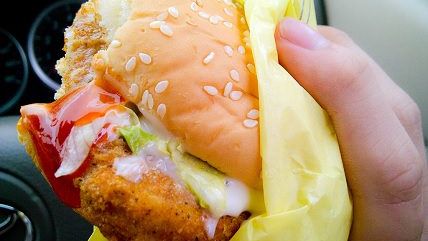McDonald's 'Cage Free' Edict Gets Activists Clucking
Market decisions do more than new laws

Not long ago, one of our prize chickens had just hatched some chicks and was strolling around the yard with the little ones in tow. Out of nowhere, a hawk descended from the sky and grabbed a chick, as momma hen squawked hysterically. In a few moments, we went from a scene from Norman Rockwell to one with Norman Bates.
The life of most animals, with our housecats possibly excepted, is "nasty, brutish and short," to quote 17th century philosopher Thomas Hobbes (who was talking about mankind). My perspective on animal issues has changed considerably after moving to a few acres in the country and watching my kids raise their animals. It's often not a pretty sight.
Last month, my wife came into the house bawling after coyotes had torn apart one of our baby Nubian goats. I bought two Great Pyrenees to protect the goats, which went well until the dogs broke into the hen house. Don't even ask. We named our newest turkey Darwin because he was the only one of 22 to survive to adolescence.
Yet the harshness of the natural world doesn't alleviate our nature, as human beings, to ponder how we treat animals. Americans give generously to animal-welfare causes and often back legislation meant to reduce animal suffering. A notable example is Proposition 2, which was approved overwhelmingly by California voters in 2008 and went into effect last January.
The measure requires our state's farmers provide more "elbow" room for hens, veal calves and many pigs. There's little pork and veal production in California and meat chickens already are mostly cage free, so it mainly changes egg farms. A follow-up law applied the same standards to any eggs sold in California. The measure has survived legal challenges.
Several months after implementation, the price of eggs has soared. Part of that is the result of avian flu that killed millions of birds, but California egg prices are now far above the national average. Some studies predict a small price difference after the market settles down, but there's no question these laws imposed enormous costs on egg farmers, who had to revamp their operations.
The really big recent news is the fast-food chain McDonald's announced it will only buy eggs from cage-free farms by 2020. "It will be increasingly hard to ignore a buyer of 2 billion eggs, especially given that McDonald's joined a flock of companies that already made similar supply-line switches," according to the Los Angeles Times.
Government regulations are not cost free, and they often have unintended consequences. The marketplace usually does a better job sorting out difficult issues than government bean (or egg) counters, but animal suffering is a conundrum.
Many economists argue government's proper role is to correct instances of "market failure." That's when the marketplace doesn't act efficiently, such as in a monopoly situation. (The latter almost always is the result of some government favor or intervention, but that's a discussion for another day.)
A similar concept comes into play regarding animals, as the market fails to factor the cost of animal suffering when it's more cost-effective to cram them into tiny cages. That perception may explain why so many Californians voted for Proposition 2. They couldn't think of another way to keep these creatures from spending their short lives in such an unpleasant situation.
Then again, the decision by McDonald's, Burger King and other restaurants to adjust their purchasing shows how public attitudes can drive change. They can often do so more thoroughly than regulators. For instance, McDonald's wants cage-free eggs, whereas California's laws only require bigger cages. The new policy may be as good for business as it is for the hens.
By the way, it's mainly in wealthy countries, where most everyone is well fed, that people have enough time and money to worry about the plight of chickens.
Those who argue that animals have "rights" are off the mark in a world of goat-killing coyotes. But there's nothing wrong with making confined animals' lives less brutish. The latest news from McDonald's reminds those who care about these creatures that they might want to spend less time lobbying for new laws and more time thinking about such voluntary solutions.


Show Comments (46)